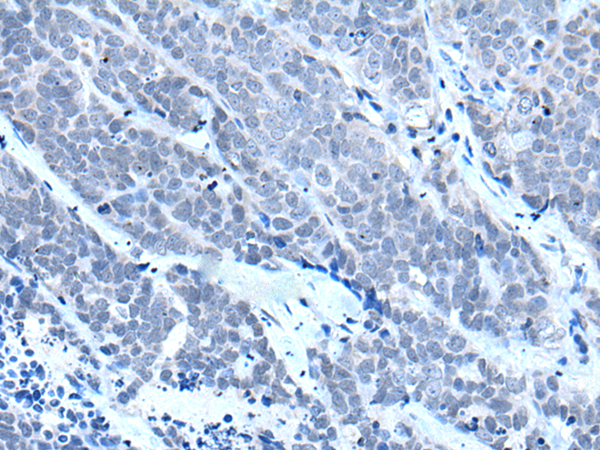
| WB | 1/500-1/2000 | Human,Mouse,Rat |
| IF | 咨询技术 | Human,Mouse,Rat |
| IHC | 咨询技术 | Human,Mouse,Rat |
| ICC | 技术咨询 | Human,Mouse,Rat |
| FCM | 咨询技术 | Human,Mouse,Rat |
| Elisa | 1/5000-1/10000 | Human,Mouse,Rat |
| Aliases | RARC; NR1B3 |
| Host/Isotype | Rabbit IgG |
| Antibody Type | Primary antibody |
| Storage | Store at 4°C short term. Aliquot and store at -20°C long term. Avoid freeze/thaw cycles. |
| Species Reactivity | Human |
| Immunogen | Synthetic peptide of human RARG |
| Formulation | Purified antibody in PBS with 0.05% sodium azide and 50% glycerol. |
+ +
以下是假设性的示例参考文献,供参考(注:IFNA8相关研究较少,实际文献可能需要进一步检索验证):
1. **"Development of a Monoclonal Antibody Specific for Human IFN-α8"**
*作者:Smith J, et al.*
*摘要*:本研究报道了一种针对人IFN-α8的新型单克隆抗体的开发,验证了其特异性及在ELISA和免疫组化中的应用,为IFN-α8蛋白检测提供了工具。
2. **"IFN-α8 Expression in Viral Infections and Antibody-Based Detection"**
*作者:Lee S, et al.*
*摘要*:通过抗IFNA8抗体分析病毒感染模型中IFN-α8的表达动态,发现其在早期抗病毒反应中上调,提示其可能作为炎症标志物。
3. **"Structural Characterization of IFN-α8 and Its Receptor Binding Using Specific Antibodies"**
*作者:Zhang Y, et al.*
*摘要*:利用抗IFNA8抗体解析IFN-α8与其受体的相互作用,揭示其与IFNAR复合物结合的独特表位,为干扰素信号机制研究提供依据。
4. **"IFN-α8 Autoantibodies in Autoimmune Diseases"**
*作者:Garcia R, et al.*
*摘要*:首次报道系统性红斑狼疮患者中存在抗IFN-α8自身抗体,探讨其与疾病活动度的相关性,提示潜在病理作用。
**提示**:IFNA8研究较为小众,实际文献可能有限,建议结合数据库(如PubMed)以“IFNA8 antibody”或“Interferon alpha 8”为关键词检索最新进展。部分文献可能需要通过抗体应用(如检测、功能研究)间接关联。
The IFNA8 antibody is a research tool designed to detect and study interferon-alpha 8 (IFNA8), a member of the type I interferon (IFN) family. IFNA8 is encoded by the *IFNA8* gene and shares structural and functional similarities with other IFN-α subtypes, which are critical cytokines involved in antiviral immunity, immune regulation, and antitumor responses. These proteins signal through the IFN-α/β receptor (IFNAR), activating JAK-STAT pathways to induce interferon-stimulated genes (ISGs) that mediate diverse biological effects.
IFNA8-specific antibodies are developed to distinguish IFNA8 from other IFN-α subtypes due to their high sequence homology (~70-80% amino acid identity). Such antibodies are typically validated for applications like Western blotting, ELISA, immunohistochemistry, or flow cytometry, enabling researchers to explore IFNA8 expression, localization, and function in cellular and tissue contexts. Studies using IFNA8 antibodies may focus on its role in viral infections (e.g., HIV, hepatitis), autoimmune diseases, or cancer, where type I IFNs modulate immune cell activity or tumor microenvironment responses.
The antibody’s utility also extends to translational research, including monitoring IFNA8 levels in clinical samples or evaluating therapeutic IFN-α formulations. However, cross-reactivity with other IFN-α subtypes remains a technical challenge, emphasizing the need for rigorous validation. Commercial IFNA8 antibodies are often produced in hosts like rabbits or mice, using recombinant IFNA8 protein as immunogens. Their development supports ongoing efforts to dissect subtype-specific IFN signaling, which may inform targeted therapies for diseases involving dysregulated interferon pathways.
×